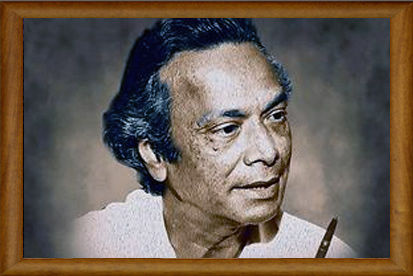Naushad was born in Lucknow in 1919 in an orthodox family that had no interest, whatsoever, in music. But Naushad knew that he was different. He used to get caned each time he returned home late from the movies, even at the age of ten. "I saw a film several times, not for the movie itself, but for the live band that accompained the songs and dances on the screen. Though I realise now what a 'pathetic' effort that was, my love for music had no bounds and I would watch these musicians on the harmonium, the clarinet, the violin, the piano - all trying to synchronise with the movement on the screen. And these were the moments the audience enjoyed most of all. And so did I in the front four-anna stall". says Naushad.
A stint as a assistant in a shop selling musical instruments earned him his first harmonium. The next step was to the orchestra pit of a local cinema, against of course, the wishes of his father.
Naushad then got entangled with a junior theatrical club. He was accepted only because of his films for music, even though he was underage. "Later, when a natak company came to Lucknow, I joined it. They were playing Laila Majnu. This was the first time i did not bother about anyone at home. I ran away with them and visited places like Jaipur, Jodhpur, Bareilly, Gujrat. In Viramgaum, the company flopped and had no return home."
It was in 1937 that a broken but not embittered Naushad stepped wnto Bombay. And his long struggle started all over again. The only person he knew in Bombay was the head master of the Anjuman-I-Islam High School with whom he stayed for a while. "By sheer chance I came across a Harry Darrowits. He was making a film called Samunder. I was appointed by him on Rs. 40 a month as a pianist in the orchestra conducted by Mushtaq Hussain. Ghulam Mohammad, who later became my assistant, used to be paid Rs. 60 then. Mushtaq Hussain was a famous composer from New Theatres, Calcutta, who came to join Film City at Tardeo. Later I was able to prove my creativity with a song (on the piano) for a Russian producer by name of Henry Darwidge. He was making a film called Sunehri Makdi (The Golden Spider)". When Harishchandra Bali, a well known music director walked out of the film Pati Patni, Naushad got his first break in directing music, with a regular salary of Rs. 60 a month. Soon after he was designated assistant to Mushtaq Hussain. But, as luck would have it, the Film City closed down. Luck came again, in the person of Manohar Kapoor. He was scoring the music for a punjabi film, Mirza Sahiban, which lyricist Madhok was directing for Ranjit Movietone. Naushad joined Kapoor for Rs. 75 a month "with cuts for days when i was absent, regardless of the reason, Chandulal Shah was the boss who liked my work and my enthusiasm. Mirza Sahiban was a sensational box office hit and i became a permanent employee on the Ranjit roster." Slowly, but surely, Naushad began his climb up, with the help of the late Khemchand Prakash, Madhok, Bhavnani, Gvalani and a few more. He directed the music for Bhavnani's Prem Nagar. "I was engaged by him on Rs. 100 a month to be raised to Rs. 150 a month after three months." This was soon followed by a number of assingnments which elevated Naushad to a 'respectable' position. He was offere 'Mela' by Prakash and was paid Rs. 600 for the entire film. He received Rs. 1200 for the next film, Darshan, followed by Satation Master for which he received Rs. 1500. In the latter film, Naushad introduced Suraiya as a playback singer. Not long after, Naushad was called by Kardar, someone who had ignored him for a long time. Naushad worked as a music director for Kardar films, on a salary of Rs. 500 a month, till 1952. He was also permitted to accept contarcts outside the company. In fact, it was the outside assignments that fetched Naushad big money. He won fame for his music in Rattan for which he earned Rs. 8000. "Today, it seems a small sum considering the fact that the success of the film's music brought a crore of rupees to the fortunate distributors and earned half as much again from the phenominal sale of its records alone. However, the money was good enough at that time, and earned me my name."
And therafter there was no looking back.

